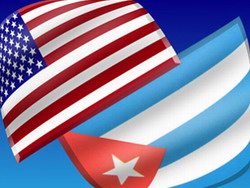U.S.-Cuba Relations: 1 Step Forward, 10 Steps Back
- Submitted by: admin
- Havana
- History
- international
- United States
- Personalities
- Politics and Government
- 01 / 27 / 2010

Cuba's position towards its relations with the U.S. appears to be returning to a heightened degree of mistrust and apprehension in a reaction to having its citizens singled out for extra scrutiny under beefed-up anti-terrorism procedures.
Although the island nation has long been calling for an end to the U.S.-imposed embargo and a relaxation of travel restrictions between the island and the United States, the Cuban government's reaction to heightened security screenings for
Cubans travelling to the United States seems to be a step backward from any recent warming in relations between the two countries.
Due to recent concerns about terrorist attacks — cautions that have increased since an apparent effort by a Nigerian man to blow up a passenger airline as it neared Detroit on Christmas Day — increased security measures call for additional screenings of travellers who are of Cuban descent.
Cubans share the distinction of the mandatory supplementary screening with citizens of Iran and Syria. The main reasoning behind the extra screenings is based on the U.S. State Department's list of "state sponsors of terrorism."
Since 1980, Cuba has been on that list, along with many Middle Eastern countries. U.S. officials consider Cuba to be a state-sponsor of terrorists because of the island nation's support for rebel groups that threaten the government of Colombia.
U.S. officials also consider Cuba to be a centre of "black market" transactions that often include illegal goods and take place with no official records.
The increased screening of Cubans entering the U.S. has created uproar in the Cuban government. Josefina Vidal Ferreiro, director of the Cuban Foreign Ministry's North American affairs office, said that the new heightened security measures against Cubans were "discriminatory and selective".
Some observers believe that the Cuban government's response to the U.S. travel restrictions could mean that negotiations between the two countries on their decades-old differences will likely fall apart.
Prior moves by the U.S. to relax restrictions on travel to and from Cuba had showed promise of future amiable relations to come. Some in the Cuban exile community in the U.S. said they believed that loosened travel restrictions between the nations
could be the first steps toward peaceful resolution of their differences.
President Obama began his term with a promise of friendship to Cuba, a pledge that included relaxed travel and financial restrictions for Cuban-Americans who wished to return to the island for visits.
Tourism spiked, and optimism was further renewed when discussions between the two nations dealt with topics ranging from a resumption of mail service to cooperation on disaster relief assistance and investigations into illegal narcotics.
Further talk in the U.S. Congress hinted at hopefulness for a day when U.S. travellers would face no restrictions on going to Cuba.
The recently heightened security standards applied to all Cubans entering the U.S. have started a new fire under long-simmering tensions between the countries, though.
The Cuban government's posture towards Obama also appears to have gone awry. Former President Fidel Castro, who remains a power in Cuba, initially referred Obama as "a breath of fresh air." These days Castro is stating that Obama has been hiding menacing intentions toward Latin Americans.
Source: news.newamericamedia.org/
Comments